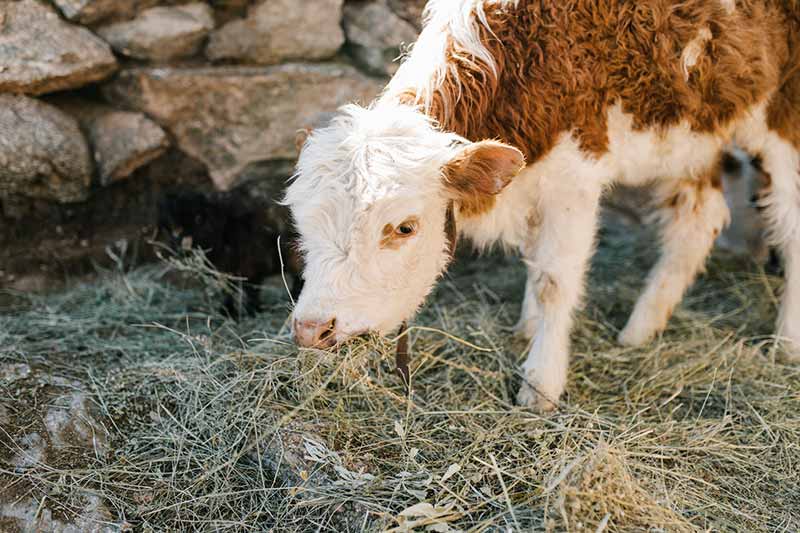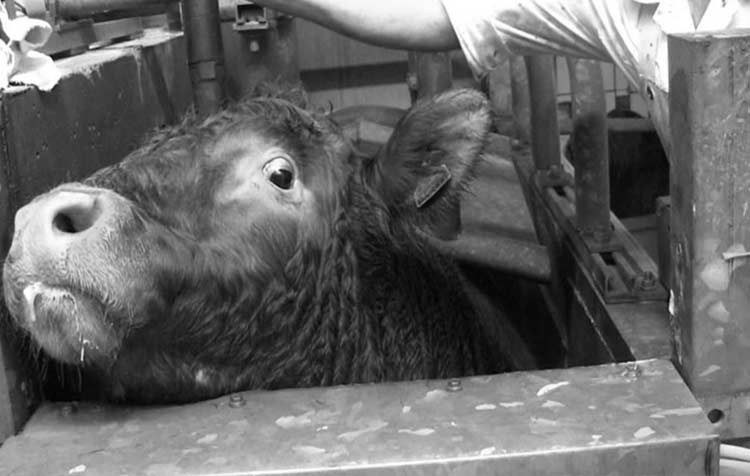Are we allowed to kill animals to eat them? A legitimate question! After all, every German eats about 150 animals a year.₁ 74 billion animals are killed worldwide every year for our consumption.₂ And that's despite the fact that a balanced plant-based diet, according to American Dietetic Association is possible.₃ In addition, the consumption of animal-based foods is one of the main drivers of the largest Environmental problems of our time is. There is simply no need to kill the animals. This is another reason why meat consumption is often reflexively justified with arguments like "eating meat is legal". But is something really automatically moral just because it is allowed? Are we therefore allowed to kill animals?
In this article I would like to answer these questions and explain the difference between morality and law. Let's go!
You feel anger about the cover picture? Then your moral compass is probably talking to you. Because it just shows the normal everyday life in a slaughterhouse. Those who pay for animal products also pay for the actions that require them.
Why the difference between morality and law is so important to me
Even if animals are no longer considered things, they do not have actual rights and obligationsthat are legally enforceable. They don't even speak our language, so they could sue for their rights. That is why it is so important that we make ourselves aware of the difference between morally defensible and legal decisions.
Here are some "Excuses" from meat eaterswhich refer directly or indirectly to the inferior rights of animals, which I even used to hay trumpet myself, but which I now no longer consider to be correct:
- "The life of animals is more important than the life of an animal": I also find the life of a human being more important than the life of an animal. But that does not mean that the life of an animal is worth NOTHING. And precisely because it is worth something, the life of animals is also to be protected. That is what my moral compass tells me.
- "Animals are different from us": Biologically speaking, we humans are animals, too. Nevertheless, we differ in many ways, of course. But there are also incredibly many similarities, such as consciousness, social life, intelligence, Emotions or sensation of pain.
- "Animals eat animals too": Animals don't have a moral compass like we humans do. And when a lion hunts and eats a gazelle, it does so for reasons of survival. We, on the other hand, have the choice to eat a plant-based diet and can also survive with a vegan diet.
We should not ask ourselves whether we are allowed to kill animals. But whether we Animals are worth enough that we do not kill them. Of course they are. We should not make our moral values dependent on the behavior or "lower value" of animals. Or do we want to sniff each other on the backside in future, like lions do? 😉
The concepts of morality, law & morality defined

In order to answer the question "Are we allowed to kill animals?" we should first clearly define the terms morality, law (or legality) and morality. Here I have compiled the relevant definitions for you.
Morality defined: Morality is understood to mean all customs, norms and values that a society has imposed on itself and that are generally recognized by it. Morals are intended to enable people to live well together and claim to be universally attainable by all people equally, without exceptions. If someone violates the moral standards of a society, feelings of guilt should generally arise.₄
Law/Legality defined: Individual or government action is legal if it complies with applicable law and statute.₅
Morality defined: The totality of moral views valid in a given society.₆
So, by definition alone, morality and law are different. Society sets itself a moral compass for acceptable behavior - but not the state, nor any code of law. They are simply our personal values. Law and legality, on the other hand, are things that the state defines (also on the basis of our values) and also adjusts if necessary.
Is the killing of animals allowed?
It is forbidden to kill another human being - and it is punished severely. We have learned that it is not right to take the lives of others. But with animals it is different, at least from a legal point of view. Our legal system does not provide general protection of life for animals. Therefore, they may be killed even if there is no logical reason to do so. However, according to the Animal Welfare Act (TierSchG), the killing may be not agonizing and wanton pass. Animals may only be killed under professional stunning or otherwise, as far as reasonable under the circumstances, only under avoidance of pain.
If these regulations are observed, the killing of animals is legal. Punishable, however, are the "unjustified" killing of animals as well as the crude and torturous Animal mistreatment. This also includes the cruelty to animals by omission.
The killing of animals is therefore permitted per se. But is it humane and morally justifiable just because it is legal?
Tip: Often, the justification of meat consumption is also based on the "humane battles". In the linked article you will learn whether you can really take the life of a living being in a humane way.
Is something automatically moral if it is legal?

Now we know that the killing of animals is basically allowed - but are our actions also morally justifiable just because they are legal? The answer is a resounding NO. Morality and legality are two absolutely different things. Our morals are made by ourselves and can be adjusted by ourselves from one second to the next. The laws and the law itself are defined by the state and possibly changed through social debates and negotiations over time.
Slavery was also allowed. It was only in the course of the 19th century that a change in thinking set in. Until then, the southern states of America, for example, were allowed to buy African slaves to use on their cotton plantations. The slaves had no rights and received no wages for their labor services. Just because slavery was allowed doesn't make it moral, right?
And should it also be allowed to eat dogs? Most people in Germany would probably answer this question with a frowning NATURALLY NOT. But in countries like China, eating dogs is commonplace - and legal. Do you therefore also find it morally justifiable?
We hold: just because something is legal, it is not automatically morally defensible. And just because something is morally defensible does not automatically make it legal. Morality and legality are two completely different things.
Are we allowed to kill animals? Making people aware of the difference between morality and law
I think it is incredibly important that we realize that a law does not dictate what is morally acceptable and what is not. Instead, we need to question existing structures and, if in doubt, ensure that something changes.
But if you still believe that we can just kill animals as we please, ask yourself the following questions:
- What characteristic of an animal gives us the right to take animals' lives?
- And why do we pet dogs and cats, but slaughter cows and pigs?
Eating meat is not a personal decision in the end anyway - because this decision always has a victim. And just because it is not forbidden, it does not automatically become moral. Perhaps we should ask ourselves whether it would be better to make the killing of animals illegal, in order to also benefit from the positive, psychological effects for our coexistence.
Finally, I would like to give you some further articles to the hand:
- Veganism & Religion - Does God allow to eat meat?
- Speciesism - What does it mean?
- Stop factory farming
- Why live vegan?
Do you have questions or suggestions about morality and law in animal welfare? Then feel free to write me a comment!
Be always kind to animals,

PS.: Look you with pleasure further in the Vegan Blog um. Lene for example, why Veganism also human rights promotes and does not advocate exclusively for the rights of animals!
References:
₁ Albert Schweitzer Stiftung für unsere Mitwelt: Germans eat over 12 billion animals per year (as of 29.09.2010), https://t1p.de/0qum. [29.03.2021].
₂ Things Explained - In Brief: Meat - The World's Tastiest Evil, YouTube, Jan. 24, 2019, web, Mar. 16, 2021 at 08:50 AM, in: http://y2u.be/y6f3dwxexZM.
₃ American Dietetic Association; W. J. Craig; A. R. Mangels: Position of the American Dietetic Association: vegetarian diets (as of July 2009), https://pubmed.ncbi.nlm.nih.gov/19562864 [July 24, 2020].
₄ Andreas Suchanek: Morality, available at https://t1p.de/9fm2. [29.03.2021].
₅ Federal Agency for Civic Education: Legality/Legal Principle, https://t1p.de/wcg8. [29.03.2021].
₆ Berlin-Brandenburg Academy of Sciences and Humanities: Morality, https://www.dwds.de/wb/Sittlichkeit. [29.03.2021].






